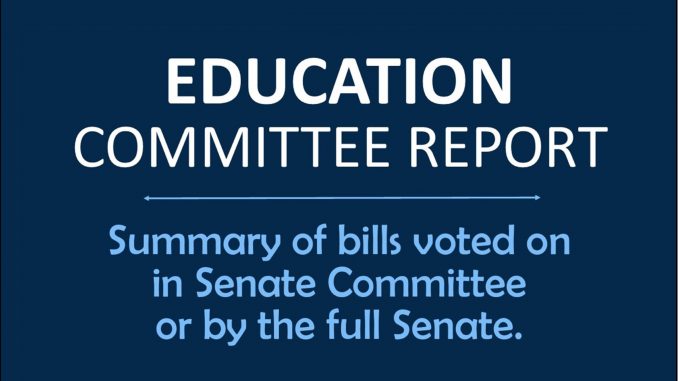
SF 238 – Expands criminal offense of sexual exploitation by a school employee
SF 240 – Requires a new RFP for a statewide assessment that is aligned to the Iowa Core
SF 274 – Computer science education standards and taskforce
HF 217 – School employee disciplinary actions reported to BOEE
FLOOR ACTION
SF 238 expands the criminal offense of sexual exploitation by a school employee to include a person employed by a school district full-time, part-time or as a substitute; and a person who performs services as a volunteer or contract employee for a school district and who has significant contact with students.
A committee amendment modifies the volunteer or contract services portion of the bill to say “direct supervisory authority” over the student. The amendment also strikes from the bill a protection against so-called “Romeo and Juliet” type relationships. Prior to the amendment, the bill had indicated a “school employee” does NOT include a person who holds a coaching authorization if the person is less than four years older than the student and the person is not in a position of direct authority over the student; or a volunteer for the school district if the volunteer is less than four years older than the student and is not in a position of direct authority over the student.
A person who commits sexual exploitation by a school employee commits either an aggravated misdemeanor or a class “D” felony, which is punishable by confinement for no more than five years and a fine of at least $750 but not more than $7,500.
[3/7: 49-0 (Bisignano excused)]
SF 240 strikes the State Board of Education’s decision to move forward with Smarter Balance, a statewide assessment that is aligned to the Iowa Core, accurately describes Iowa student growth and provides a fair measure of student readiness for college or career. Current law requires the State Board of Education to set core academic indicators in mathematics and reading for grades four, eight and 11; and for science in grades eight and 11. This bill strikes the requirement that all students enrolled in grades three through 11 take an assessment of their progress on the core academic indicators.
The bill requires the Department of Education to issue a new request for proposals for the selection of a statewide assessment of student progress to be administered in the school year beginning July 1, 2018. The assessment must measure individual student growth and be aligned to the Iowa Core for grades three through eight, and at least one high school grade. The assessment must be capable of measuring student performance in English language arts, mathematics and science. The assessment must be available in both paper-and-pencil and computer-based formats. Potential vendors or providers may collaborate to meet the requirements. The Department of Education must issue the request for proposals by April 30, 2017. In addition, the bill gives the State Board of Education the ability to accept the best proposal and write rules to implement the proposal without further legislative approval.
Finally, the bill makes a significant change to accredited private schools and assessments. Currently, all accredited private schools must develop and file with the Department of Education a comprehensive school improvement plan that includes assessing educational needs and establishing local education standards and student achievement levels. Accredited private schools are currently required to give the same annual statewide assessment as public schools. The bill changes this requirement so that all accredited private schools are exempt from the statewide annual testing requirement.
[3/8: 39-10 (Bisignano, Danielson, Dotzler, Hart, Hogg, Jochum, D. Johnson, Mathis, Petersen, Taylor “no”; Chelgren excused)]
SF 274 requires the state to develop computer science education standards, computer science instructor endorsements and authorizations, and alternative ways to obtain endorsements and authorizations. The bill establishes a computer science professional development incentive fund for schools that adopt the standards and directs the Department of Education to convene a computer science education work group. It is the Legislature’s intent that each high school offer at least one high-quality computer science course, middle schools offer exploratory computer science and elementary schools offer the basics of computer science.
A Senate amendment modified the funding mechanism of the bill by striking the appropriation fund set up and providing language for a fund to accept private donations, as well as any appropriation, to do this work. The money would be disbursed to school districts or accredited nonpublic schools for tuition reimbursement for teachers seeking computer science endorsements. The Department of Education will convene a computer science education work group, which will submit recommendations by November 1.
[3/7: 49-0 (Bisignano excused)]
HF 217 adds to the list of disciplinary actions taken against a licensed school employee that must be reported to the Board of Educational Examiners (BOEE). Currently, school districts and accredited nonpublic schools must report to the BOEE any instance of disciplinary action specified in the Code 272.15. The bill adds: being on school premises or at a school-sponsored activity while under the influence of, possessing, using or consuming illegal drugs, unauthorized drugs or alcohol. The Senate adopted an amendment to conform the Senate File to the House File and the House File was then adopted.
[3/7: 49-0 (Bisignano excused)]
